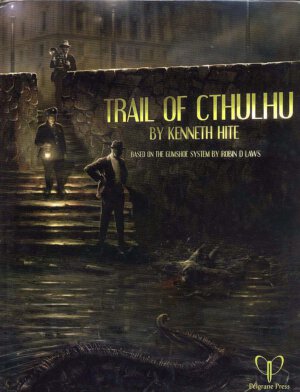
Publisher: Pelgrane Press
Authors: Kenneth Hite and Robin D. Laws
Artist: Jérôme Huguenin
Year: 2008
Players: Two or more players
Ages: 12+
Book: 248 Pages, Hardcover
Genre: Roleplaying game of Lovecraftian horror and investigation
MSRP: $39.95 for the hardcover (includes PDF) or just the PDF at DriveThruRPG for $24.99
I have to say I’m a bit late to the party when it comes to Trail of Cthulhu (TofC). The system was released back in 2008 and slowly, but surely, has gained a bit of a following in the world of RPGs. Since I spent nearly twenty years running Call of Cthulhu (CofC) for Elliott, his nephew Paul Miller, our friend Ed Rupprecht and other pals I felt I probably had a good background to honestly review Kenneth Hite and Robin D. Law’s take on the Cthulhu Mythos. Publicly, Pelgrane Press has announced that this is their take on CofC for the 21st century to bring the creations of H.P. Lovecraft to gaming tables.
Obviously, the original Chaosium CofC is now more than thirty years old and there are some creaky aspects of the game no doubt that may not appeal to newer role players. I’d say one of the main things that stand out about Call of Cthulhu being a bit too old school is the fact that unspeakable, mind destroying terrors from beyond our perceived reality have hit points and armor ratings to protect those hit points. Could even the most stalwart of heroes actually destroy one of these horrors? Absolutely not, so it’s silly to say Cthulhu or Nyarlathotep have X number of hit points. I think if you went head to sphere against Yog-Sothoth you could expect those player characters to be instantly vaporized or at least have their minds turned to goo! This aspect of CofC is a throwback to the classic RPG concept of everything having some sorts of statistics that could be universally applied by players across the globe. Yet even with a handful of these head scratchers, Call of Cthulhu is still a must have for any GM, especially if they have any interest in running a horror role playing game.
This isn’t a review of CofC but one for Trail of Cthulhu so let’s focus our attention there.
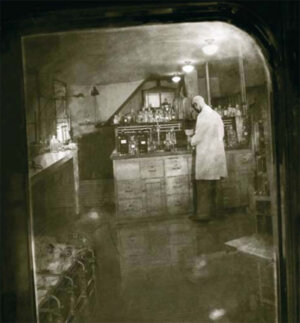
Trail of Cthulhu eliminates this issue because the player characters (known in both CofC and TofC as Investigators) simply receive clues by being present at any scene and, in doing so, are pointed in the direction of areas for further investigation. Player characters have various skills and skill pools from which can spend points to gain additional information or simply look impressive while gleaning the info. In other words, players can arrive at the scene of a murder and find all the clues available to move them along to another thread of investigation without rolling any dice or needing any particular skill. This is only with investigations so other areas such as combat do require skill uses and die rolls. The mechanic to resolve these situations is pretty simple, roll a six-sided die and add as many points from your ability pool associated with the situation as you like. If you meet or surpass the difficulty number presented by the Keeper it’s a success. These rolls are only for exceptional situations so just driving a car doesn’t mean you have to make a roll to simply start the engine and press the accelerator…
Having the clues hand fed to players might come across as a bit of a snore but all in all I don’t see a huge issue here because the Investigators still need to process that the information they find. I find it interesting that Hite and Gumshoe designer Robin D Laws make a point that utilizing this style of simulating an investigative process isn’t “railroading” players along to a preordained conclusion; I suppose I can kind of buy that. What doesn’t really jive with me is simply the fact that the Investigators (who for the most part are not professionally trained for this kind of work) pop up at a location and know what there is to know simply by walking in the door or arriving on the scene. Some real honest roleplaying should be required: “I’ll have my character take a look through the desk and then search through the bookshelf,” plays a lot smoother than simply saying here’s the clues so what’s next?
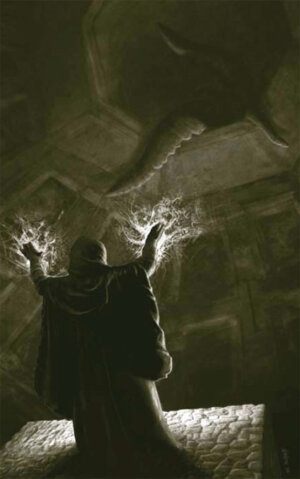
Sanity is also revamped and broken into two factors: Stability and Sanity. Stability tracks the a character’s mental health in the moment while Sanity is a long term degeneration of a grasp of reality – or at least what the average person judges to be reality. Stability refreshes between adventures but Sanity loss is permanent. One part of the Sanity rules which may infuriate players is insanity isn’t role played by the owner of the character but by the other players at the table. Hite points out some playtesters hated this approach and offers the alternative of having the insane character’s owner act out the madness.
Stability also comes into play with the magic rules for TofC but the less said about the magic system as a whole the better. For some reason more mentally stable spell casters will be more successful than those less stable. Personally I’d think it would be the other way around. All in all the magic system seems very underdeveloped and feels practically tacked on. Also, the way the magic and stability rules are presented implies that enemies and monsters that have use of magic automatically succeed. This isn’t spelled – no pun intended – out in the rules but that’s the understanding you’ll get on a read through. As presented in this core rulebook, magic is almost an unwanted feature to delve into and certainly comes across as a lot less interesting than in CofC.
Combat also seems extremely abstracted and a bit underdeveloped as well but this isn’t as big an issue as the magic system as any good Lovecraft tale shouldn’t have a ton of focus on laying down a smack down any way.
The rules provide for two modes of play which are Pulp or Purist. Purist mode is more of a model of Lovecraft’s original works where people are fragile human beings and once they learn of the horrors of the Mythos the clock is ticking until their terrible fate is sealed. The Pulp mode is more along the lines of two fisted tales of adventure which include a Mythos flavor but the odds are the team of Investigators will live to tell the tale and continue the fight another day. I’d say in my experience, and I’m sure Elliott will back me up on this, the way I approached CofC games was as a bit of a mixture of Pulp and Purist. Sure characters died or went mad but I wasn’t very keen at killing them off at every turn as I felt it was a drawback to the overall story telling. I’d also do my best to include some action packed chases or moments of high adventure in every session but never at the expense of what I was trying to achieve: a sense of the unknown and mystery behind every twist and turn that would eventually lead to a shocking, and hopefully, terrifying payoff!
This is where I think TofC overall really misses the overall mark.
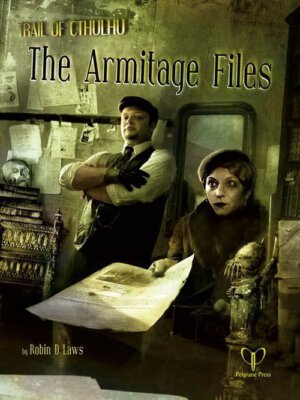
Lastly, it seems that quite a bit of space is devoted to defending the changes Trail of Cthulhu has made to what would be familiar to those with experience playing or running Call of Cthulhu. I find all of that to be too much of a distraction and smacks a bit of conceit. “Oh, sure, some of our playtest groups really hated this aspect but we stuck with it anyway because what do they know?” is how some of these side notes come across. I think the author would have been better served not mentioning any of this and just presenting the material without the additional editorializing as these thoughts do less to inspire those new to gaming the Cthuhu Mythos to play TofC as opposed to picking up CofC to check it out for themselves.
All in all, there’s a lot of interesting info included in TofC and it’s obvious Ken Hite knows not only his Lovecraft but RPGs in depth. I like the take on the Elder and Outer Gods as there are various example of how they can be presented in a game without saying Cthulhu has 400hp and 20 points of armor. There’s also a good amount of nuggets to mine in regards to setting the game in the 1930s and the section about framing your campaigns that makes for a good read. I’m not trying to say Trail of Cthulhu is bad or should be avoided; I just don’t feel it pulls off what it claims the game was designed to do. As I mentioned before, I’ve never been the sort of person who runs any sort of RPG according the rules as written. With that said I don’t find enough in the core rules system that would really incent me to change over from running CofC and migrating to TofC. I find the overall feel of the core mechanics to be a bit bland and the adventures I’ve peeked at don’t have a serious Cthulhu vibe or even that little extra *oompf* that an excellent horror game can bring to the table. I can certainly recommend TofC as a good read that will bring some new wrinkles to just about any horror RPG but don’t expect any big scares along the way.
[rwp-review id=”0″]



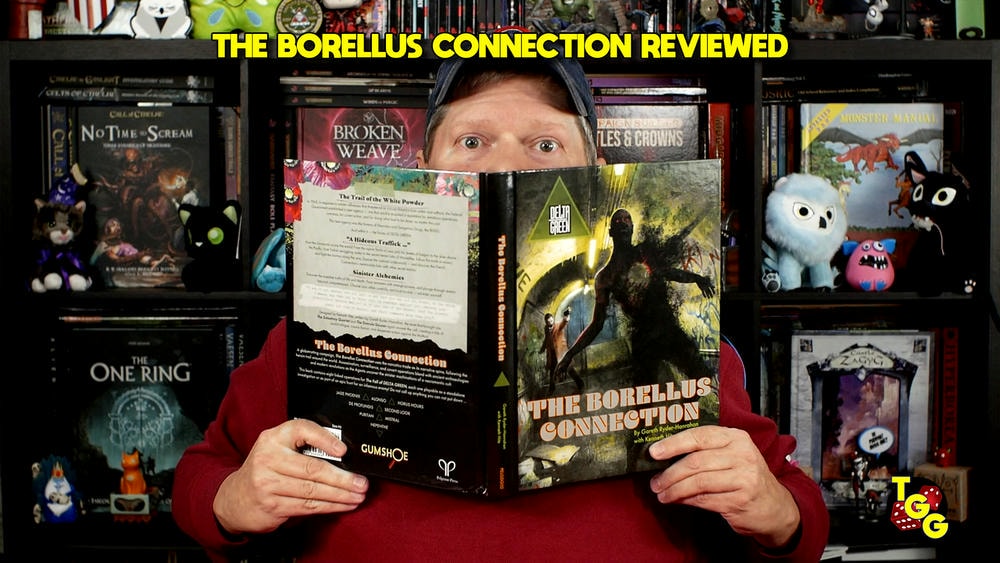
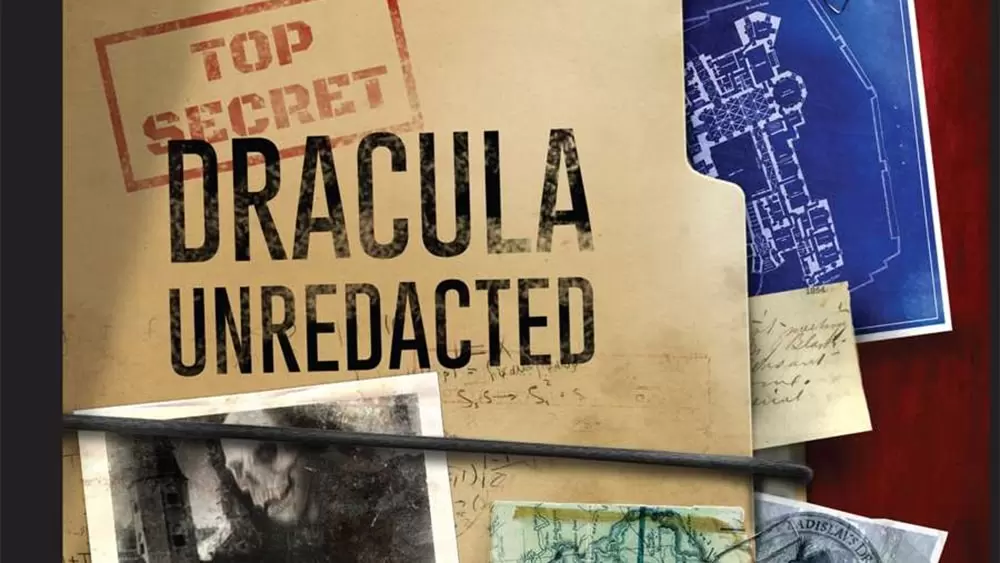
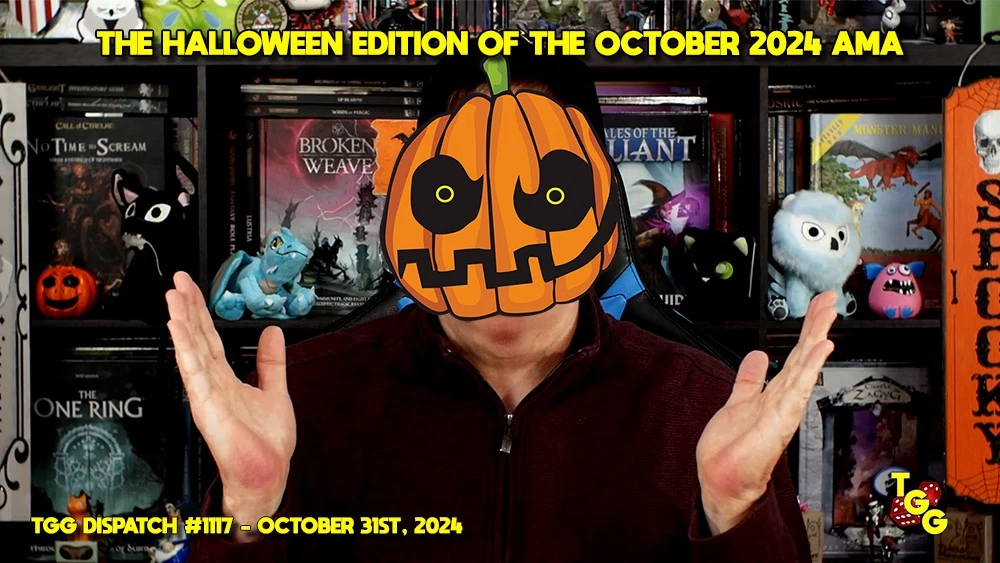
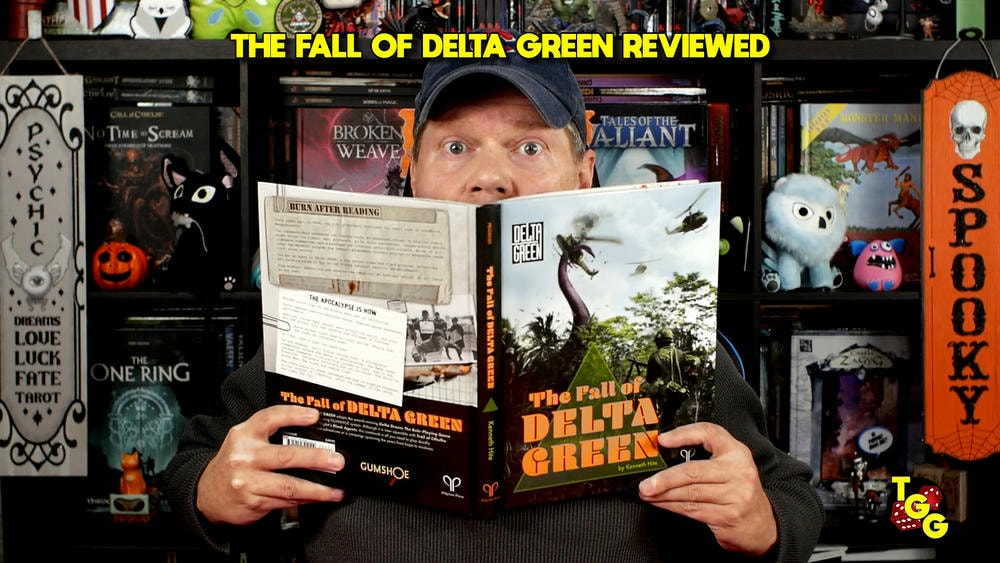







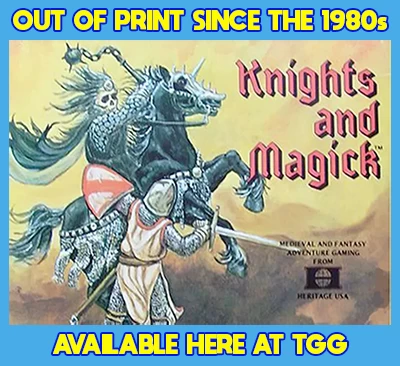



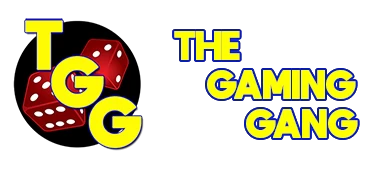
Have you actually played the game?
Actually Richard, I did have a chance to sit in on a session of Trail at the time I wrote the piece but I didn’t use that as a real basis for my review; I’m the sort of GM who likes my Lovecraft to run of a certain stripe and what I played didn’t match up with my tastes. I’m not knocking the way that particular gaming session was run but Trail seems to present more of a kinder-gentler Mythos adventure tale. I’d even go as far as saying Pelgrane was more about producing fairly lackluster one shot adventures for ToC at the time of the review whereas I’m more interested in weaving a much bigger tapestry in my campaigns.
ToC always struck me as a way for Pelgrane to shoehorn Lovecraft into their Gumshoe system, as opposed to fully embracing the Lovecraft lore, more than anything else. Or, as I mainly considered, Pelgrane was producing a “Cthulhu for Dummies” sort of game. You can’t tell me that anything Pelgrane has ever released can come anywhere near the best of Chaosium’s CofC adventures and campaigns. Thus my feelings ToC is a pale imitation of CoC; while everyone and their brother think they can put together a better Lovecraftian RPG than Call of Cthulhu, the truth comes to light they focus only on the few minor quibbles everyone has always had with CofC’s system (which GMs with even an inkling of how to run a game have always glossed over or ignored) and stumble regarding everything else you need to present a top notch Cthulhu game.
That said, I have to admit I like the newer direction Pelgrane seems to have moved towards with recent releases like The Apocalypse Machine campaign. Maybe Ken Hite is more involved in goings on or Pelgrane realizes roleplayers like to spend more than an evening or two screwing around with their characters but there’s a bit of a different sense in what the company is doing with ToC. That still doesn’t mean I’d ever take this system over CofC though.
I’ll point out that while you may be a fan of ToC (which you don’t even indicate) I’ll still stick with the tried and true Call of Cthulhu.